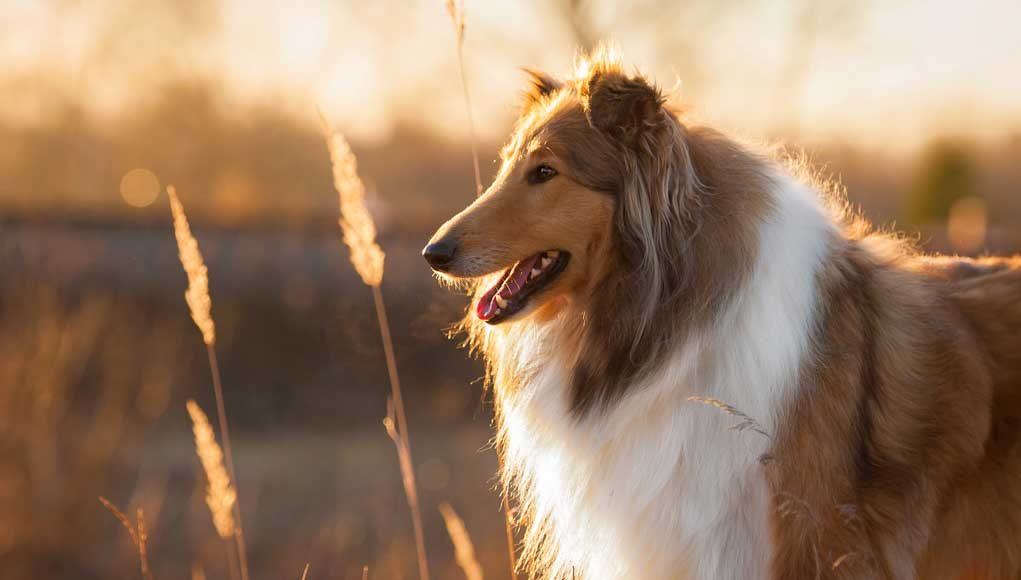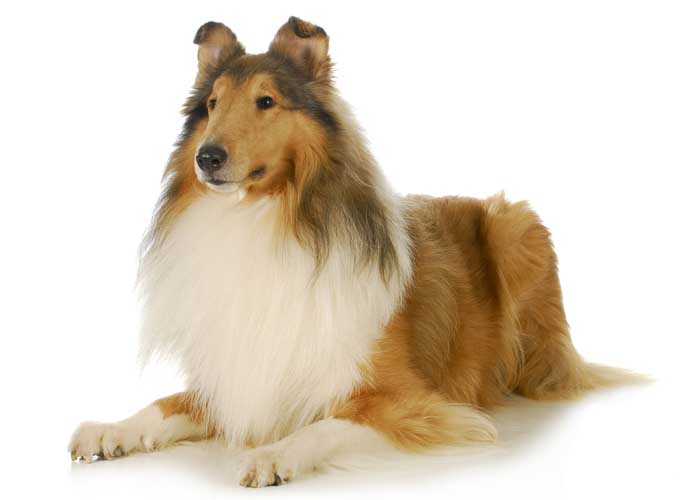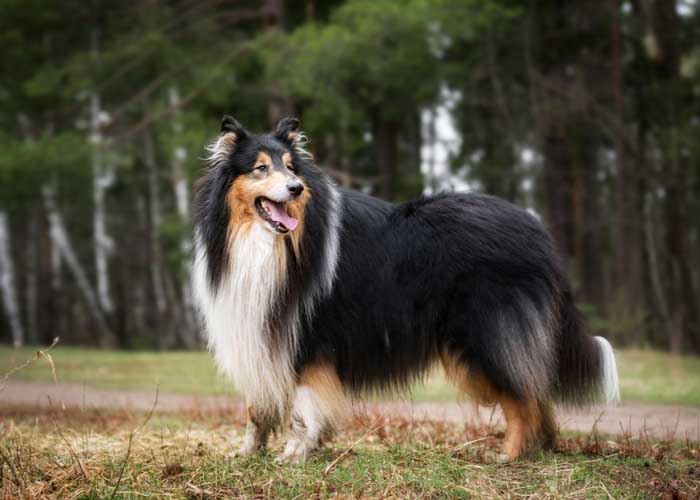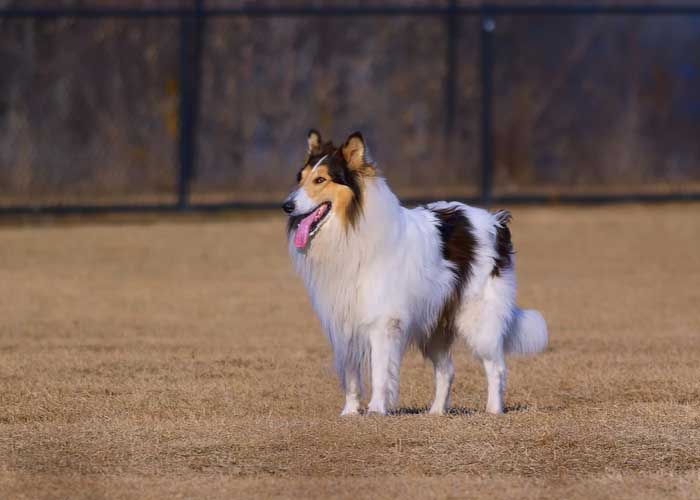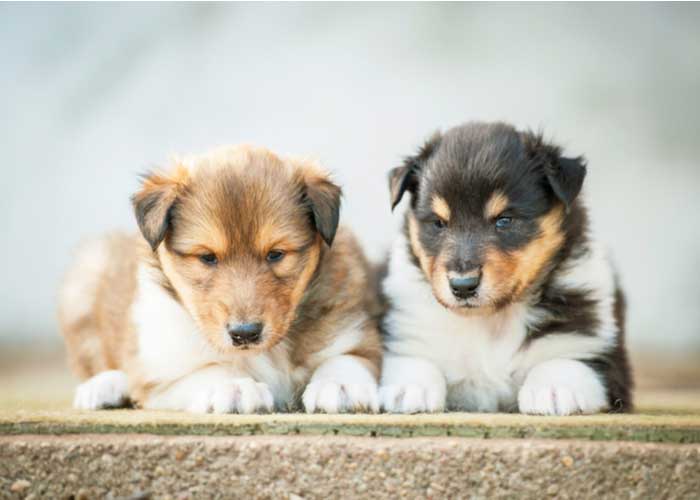Table of Contents
The Collie dog breed is a graceful dog noted as a great companion for young and old. In this article, you learn more about living with this herding breed.
Gentle and loyal, the Collie is among the most recognizable and beloved dog breeds. He is protective by nature but never known for being aggressive.
This playful dog is very vocal. The right training and activity level can lessen the barking.
Not only is he of great beauty, dignity, and balance, but the Collie dog is intelligent, friendly, and loving. Also famous for always wanting to be with his owner, he will want to bond and please you.
He is a sensitive dog and affectionate with his family. Due to his calmness, he makes a great therapy dog.
Originally bred for herding livestock, the elegant pooch became popular because of Lassie in 1940. She is a fictional female Rough Collie featured in the novel Lassie Come-Home written by Eric Knight.
Today, the Collie breed is more of a darling pet than an all-around farm dog but still with strong herding instincts.
In 1885, the American Kennel Club recognized the breed. He ranked 38th on AKC’s list of the most popular dog breeds of 2021 and 17th among the smartest dog breeds.
Collie Dog Breed Standard
The full-coated Collie is the more familiar kind but there are two varieties of the breed. The Rough Collie and the Smooth Collie are identical except for the coat.
Height and Weight
The Collie dog is generally medium in size compared to other breeds.
Males stand from 24 – 26 inches weighing 60 – 75 pounds. Meanwhile, females weigh between 50 – 65 pounds and are 22 – 24 inches tall.
Coat
Rough Collies have long, flowing coats which are their crowning glory. The fur is abundant all over the body except on the head and legs.
Smooth Collies, on the other hand, have short, dense, and flat coats of good texture.
Both varieties come in four colors:
- Sable and White — from the shade of gold to mahogany with white markings on the chest, feet, and the tip of the tail.
- Tri-color — mostly black with white and tan markings
- Blue Merle — marbled blue-grey with black and white markings, and usually with tan shadings
- White — mostly white with some sable, tri-color, or blue merle markings
Typically, the Collie breed has the traditional white markings on the chest and tail tip.
Physcial Features of the Collie Dog Breed
Collies have long, slender, wedge-shaped faces. The eyes are almond-shaped and of medium size.
When alert, their ears are drawn up. These responsive and active dogs with pointed snouts stand naturally straight and firm.
Collie Family Life
They are wonderful dogs who go along well with children and other pets.
Especially fond of kids, the Collie dogs are charming and playful at the same time protectively watching over the young ones in the family.
They are energetic but calm, as long as they don't get bored. A bored dog can result in a noisy, unhappy fur baby.
They could feel similarly uneasy or restless if left in the backyard alone. They should live inside the house and never be chained or tied up whatever the situation is or might be.
The Collie breeds are family-oriented. Hence, they bond closely with all family members.
If you are into the great outdoors, these dogs will gladly keep up. Although they love to run, they are not hyper.
The Collie dog breeds will be happy to lie down and relax with you.
With their undying devotion, these sweet dogs are loyal to the entire family. They are also tender protectors that will safeguard other pets of the family.
Collie Dog History
The Collie originated in the United Kingdom, particularly in the highlands of Scotland and Northern England, to herd sheep, cattle, goats, and pigs.
The popularity of the breed happened during the 1860s when Queen Victoria visited the Balmoral Castle in Scotland. She came across the dogs and brought some on her return to England.
The first Collie dog was imported to the United States in 1879.
From a humble shepherd dog who functioned as an all-purpose farm dog, the Collie breed is now known worldwide as an ideal canine companion thanks to Lassie.
Collie Breed Health
The Collie Health Foundation offers great information about the health issues in this dog breed. Collies may be healthy but there is no guarantee that they will not inherit ailments.
Collie Eye Anomaly
This condition is a genetic eye disease. A qualified Board Certified Ophthalmologist examines puppies’ eyes to check this condition that could be present at birth.
Dogs with this disorder have blood vessels in the retina that do not properly develop. This leads to vision problems, or worse, blindness.
Researchers have identified the genetic mutation that causes the condition. This allows breeders to screen and carefully select to avoid CEA.
Hip dysplasia
This condition is the malformation of the hip joints that can cause pain and lameness.
Dermatomyositis
It is an inherited autoimmune skin disorder that causes inflammation of the tissues in the body.
Collie Nose
It's also known as nasal solar dermatitis, which is a congenital reaction of the skin to sunlight. The skin of the nose peels and may lose color if left untreated.
Progressive Retinal Atrophy
This condition is an eye disease that slowly deteriorates the dog’s vision.
Nodular Granulomatous Episclerokeratitis
It is an immune-mediated (inflammatory) disease that affects the dog's sclera, cornea, and nictitans.
Allergies & Drug Sensitivity
These are other conditions that could develop due to external factors like food or medicine sensitivity and allergies to dust, pollen, and the like.
RELATED: 10 Effective Ways to Naturally Boost Your Dog’s Health
How to Care for Collies
Exercise
The amount of exercise and mental stimulation Collie dogs needs are moderate. They may be longing for their next adventures.
Collies can spend their time running, jumping, and playing throughout the day but can also be couch potatoes. They are contented to simply lay around and take a nap.
When done with the activities for the day, they are calm house dogs. Collie breeds will be ready to go when it's adventure time and able to loosen up when it's time to chill.
The Collie dog breed can thrive in a small home or apartment as long as he gets daily exercise to stay happy and healthy.
He can live comfortably in the city or the country. A daily walk and a backyard where he can run and play are adequate.
Training Collies
You can housetrain the Collie easily.
A good Collie dog is a product of his background and breeding along with proper training. It's best for him to socialize from puppyhood and have parents with pleasant personalities.
Collie puppies can learn training cues and tricks fast.
Start the training from the moment you bring the pup home. Don’t wait for months — if possible, get him into kindergarten class by the time he is 10 to 12 weeks old.
Exposure to people, sights, and experiences ensures that your Collie puppy grows up to be a well-rounded pooch.
Aside from having a great start in a puppy kindergarten class, you may stroll in the neighborhood and take your pup to parks.
The Collie breed learns fast as he wants to make his owner proud. However, he gets bored with redundant obedience drills.
A bored or frustrated dog barks excessively. Keep him mentally challenged in dog sports or simply joining the family activities.
Change routines to captivate your pooch. Always use positive teaching methods.
He thrives on companionship with regular and reward-based training. The best way for him to respond is through gentle methods for him to learn happily and swiftly.
Head pats and treats will go a long way and make learning go even smoother. He may be smart and easy to train but he is sensitive and can become depressed if spoken harshly.
Dedication to training is crucial because Collies are notorious to learn the behaviors of each member of the household.
They are intuitive and focused on the people they live with — closely watching and learning from them, especially with body language.
Collie Grooming
While the Rough Collie has more volume, both varieties have double coats. This means they have a thick, softer undercoat and a thinner, flatter overcoat.
Rough Collies need thorough brushing twice a week or two to keep the coat and skin healthy. The smooth-coated variety requires less maintenance to be tangle-free, but both kinds do shed.
Overall, Collie dogs are very clean and have no doggie odor. Bathe as needed, which is required not more than once a month.
Once the coat begins to drop or sheds heavily, you can take them to the groomer to cut out the loose coat. They'll begin to put on new coats again in the fall.
You may want a Smooth Collie pup considering his hair is shorter, meaning less fur to vacuum up.
Trim the nails every once in a while, as long as they don’t get so long that you can hear them clicking on the floor.
Check the ears for signs of infection. You may want to wipe them out to spot potential problems.
Brush the teeth daily for improved overall health and better breath.
Diet and Nutrition
Good nutrition is vital to ensure healthy skin and coat, and overall health. The Collie breeds do well on good-quality dog food.
It is recommended to divide the food into two meals as opposed to once a day because they have a risk of bloating.
Ideal Owner of Collie Dogs
These types of Collies do well either in the country, the city or even in apartment living. They adapt to a variety of home environments.
These lovable dogs are happy in homes where family members have time to spend playing with them. They are joyful when given attention and human interaction.
Due to their gentle personality, the breed can bring joy to novice owners. Not only are they adoring to the one who feeds them, but also tender guardians of all family members — both humans and other pets in the household.
FAQs about Collie Breeds
What's it like owning a Collie dog breed?
The Collie is a good family dog. He loves being with people.
Collies are faithful to the entire family and are very protective. They are sensitive dogs that seem to understand humans' feelings and body language.
Does the Collie dog breed bark a lot?
The Collie dog is a big barker. If left alone for a long period without human contact, his boredom and frustration will result in barking excessively.
Collie dogs will be contented and calm enough after a minimum of two hours of exercise for physical and mental stimulation.
Can the Collie dog breed be left alone?
With proper training, you can leave your dog at home for several hours.
Ideally, you are not supposed to leave it alone especially for a long duration until he has been housetrained.
Collie Dog Breeds Summary
If you have a family with kids, the Collie dog breed could be the right canine companion for you! They are great family dogs and can be very gentle with your children.
Collies are beautiful dogs too! Their long coat contributes to a majestic look that gives quite an impact to everyone it meets.
Still, there are still many things to manage especially when they start to shed. Collies are medium-sized dogs with long coats so it means you need to make extra effort to take care of them.
So, before knowing if it is the dog that you desire, how about you ask yourself first if you are the person meant for the breed.
People purchase Collie dogs without the ability to commit to the lifetime of the dogs. If you want to bring a dog home, consider adopting one.
There are many Collie breeds in need of fostering.
Still, gather more information before getting a puppy of your own to see compatibility with your lifestyle.
You may visit various breeders and see the Collie dog breeds yourself. Find a reputable breeder who will show health clearances to prove that a dog is clear of health conditions.
The Collie Club of America has been around since 1886 to protect and promote the breed. There are members in every state that will be your point of contact if you are considering adding a Collie to your home.


